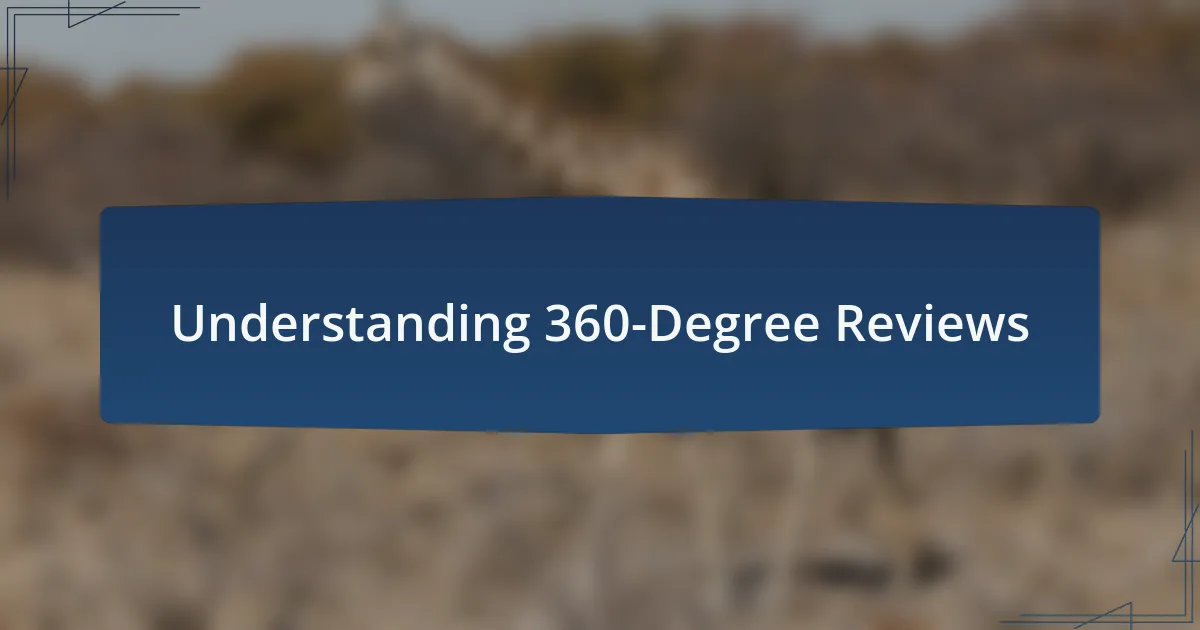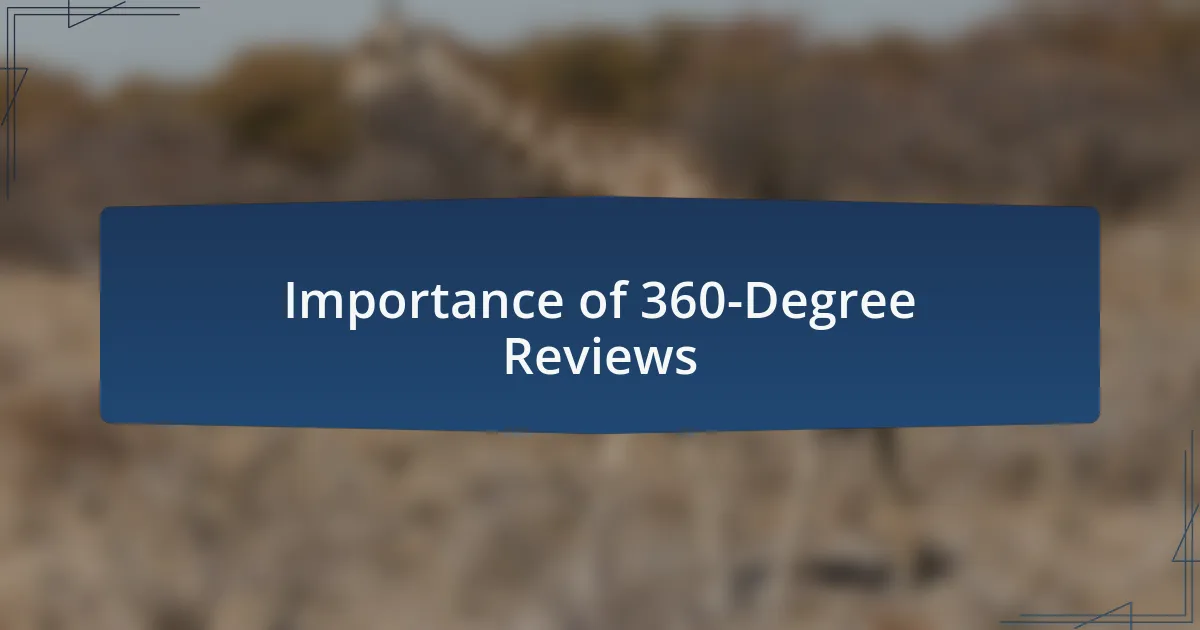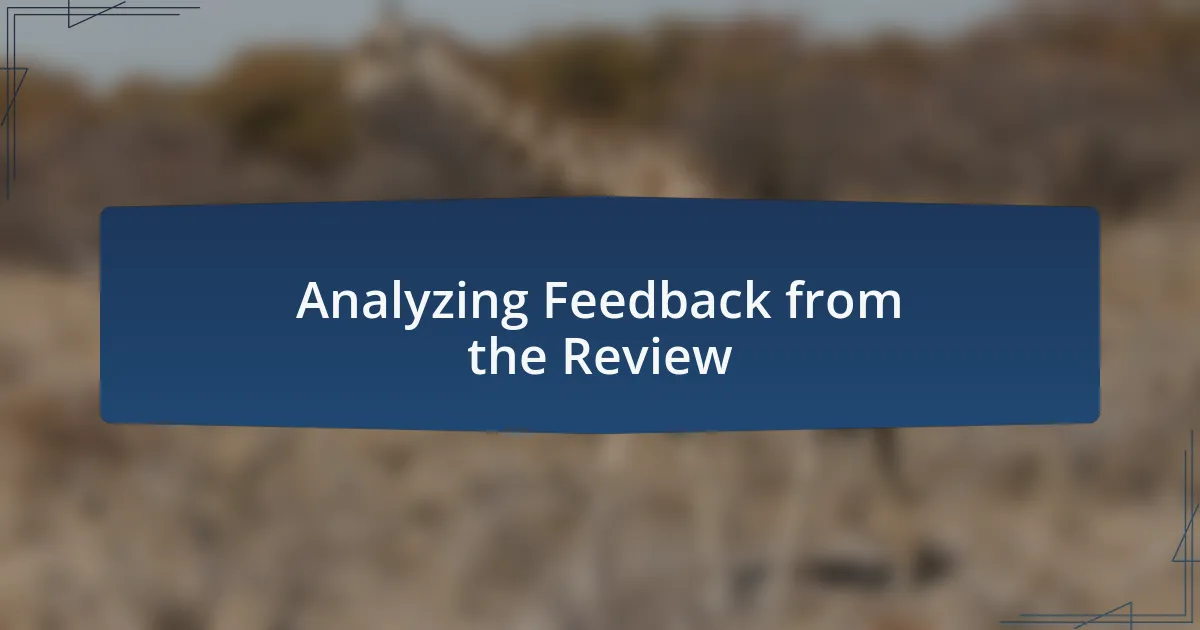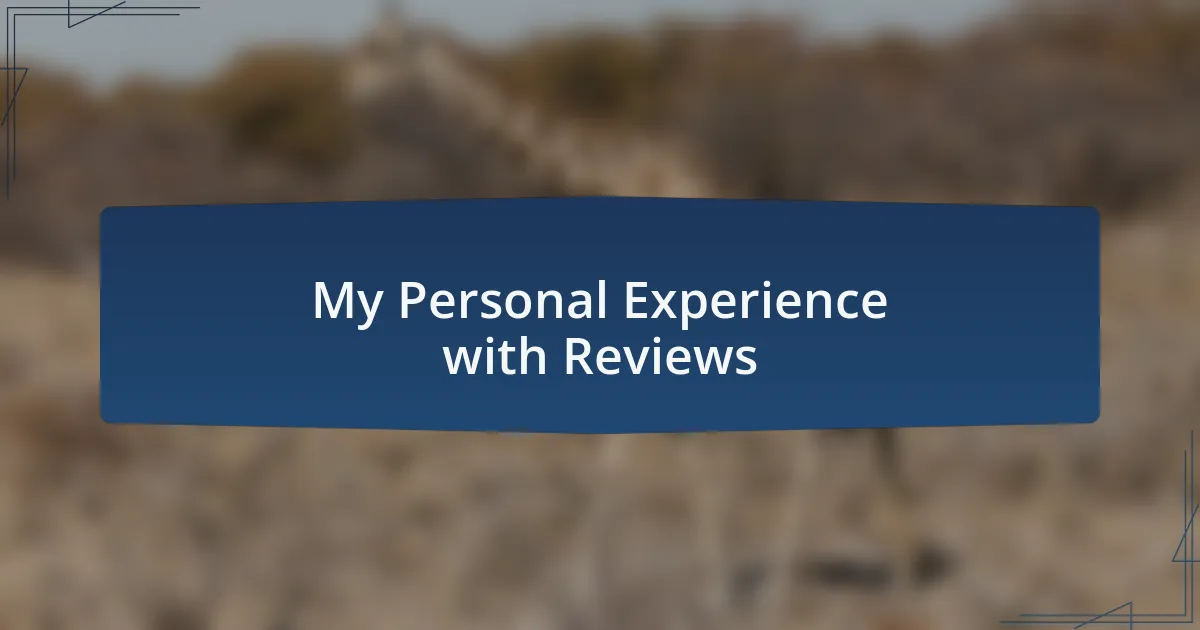Key takeaways:
- 360-degree reviews promote a culture of openness and continuous improvement by gathering diverse feedback from various sources.
- Anonymity in feedback encourages honesty, fostering personal and professional growth through constructive criticism.
- These reviews can enhance team cohesion by allowing candid discussions about strengths and weaknesses, which strengthens interpersonal bonds.
- Engaging with feedback reveals blind spots and encourages meaningful conversations that support both individual and collective development.

Understanding 360-Degree Reviews
A 360-degree review is a comprehensive evaluation method that gathers feedback from multiple sources—supervisors, peers, and even direct reports. I remember the first time I encountered this approach; it felt overwhelming to think about how many voices would influence my performance review. Isn’t it intriguing how hearing opinions from different perspectives can sometimes reveal insights about ourselves that we might not have considered?
What stands out to me about 360-degree reviews is their ability to promote a culture of openness and continuous improvement. During one such review, I received feedback from a colleague who suggested that I become more approachable in team meetings. At first, I felt defensive, but as I reflected on it, I realized their perspective could lead to better collaboration. Isn’t it fascinating how a simple suggestion can foster significant changes in workplace dynamics?
Another key aspect of 360-degree reviews is anonymity, which often leads to more honest and constructive feedback. I recall a situation where anonymity encouraged my peers to express concerns they would have otherwise kept to themselves. This made me ponder: if feedback can be shared so openly, how might that transform our interactions in the workplace? Understanding this format allows us not only to accept feedback but also to seek it actively, which is crucial for personal and professional growth.

Importance of 360-Degree Reviews
Receiving feedback from multiple angles is invaluable. I can’t help but recall a time when my manager pointed out strengths I hadn’t noticed in myself. It was eye-opening to realize that my contributions impacted others more than I had believed. This kind of holistic insight not only boosts confidence but also highlights areas that can be improved—essential for anyone aiming for personal and professional development.
The importance of these reviews goes beyond self-awareness; they foster team cohesion too. I remember my team discussing the results of our last review, and it transformed our interactions. We were able to talk candidly about our strengths and weaknesses, which made me feel more connected to my colleagues. Isn’t it interesting how vulnerability in sharing feedback creates stronger bonds?
Ultimately, 360-degree reviews can serve as a catalyst for change. Think about it—when you get well-rounded feedback, you’re not just addressing shortcomings but also building on your strengths. I truly believe that this process cultivates a growth mindset across teams. When I see colleagues embrace feedback, I can’t help but wonder: what new opportunities for collaboration might arise?

Analyzing Feedback from the Review
Analyzing feedback from a 360-degree review can be eye-opening in ways you might not expect. I recall a time when I was surprised to find that several colleagues appreciated my analytical skills, something I had always taken for granted. This revelation not only reaffirmed my confidence but also ignited a newfound enthusiasm for diving deeper into complex projects. Have you ever underestimated a skill you possess?
As I sifted through the feedback, I noticed some recurring themes that I couldn’t ignore. It was fascinating to see how different perspectives highlighted my tendency to be overly detail-oriented. Although I viewed it as a strength, they shouldered the challenges it posed to progress. I realized that constructive criticisms like this are pivotal; they reveal blind spots that can severely hinder collaboration. It made me wonder—how often do we overlook this kind of insight in our professional circles?
Finally, engaging with the feedback opened the door to meaningful conversations with my peers. I remember sitting down with a colleague who had pointed out my tendency to dominate discussions in meetings. It was initially uncomfortable to confront, but this dialogue led to a deeper understanding of our communication dynamics. Such moments reinforce the idea that feedback isn’t simply about pointing out flaws; it’s about creating pathways for personal and collective growth. How often do you find yourself shying away from these crucial discussions?

My Personal Experience with Reviews
Reflecting on my personal experience with reviews, I can pinpoint a moment that truly changed my perspective. Early in my career, I received a particularly harsh evaluation that left me feeling disheartened. At first, I struggled to process the feedback, but with time, I came to realize that it was a crucial turning point. Have you ever experienced a review that felt more damaging than constructive? That moment fueled my quest for self-improvement, helping me transform criticism into actionable goals.
There was another instance where a peer commended my leadership style during a review. Initially, I thought I was just being myself, but their praise opened my eyes to the impact I had on the team. I felt a surge of pride and responsibility; it was as if their words gave me permission to embrace that part of my identity. It’s interesting how sometimes we need others to help us see our strengths—don’t you think that external validation can provide a fresh lens through which to view our own capabilities?
Conversing with teammates after I conducted a 360-degree review created an unexpected bond. Sharing vulnerabilities over feedback made our relationship stronger, revealing layers of trust that I hadn’t anticipated. It was a powerful reminder that reviews aren’t just about evaluation; they’re fundamental to fostering deeper connections. Have you ever found that the emotional weight of discussing feedback can actually lead to enhanced teamwork?